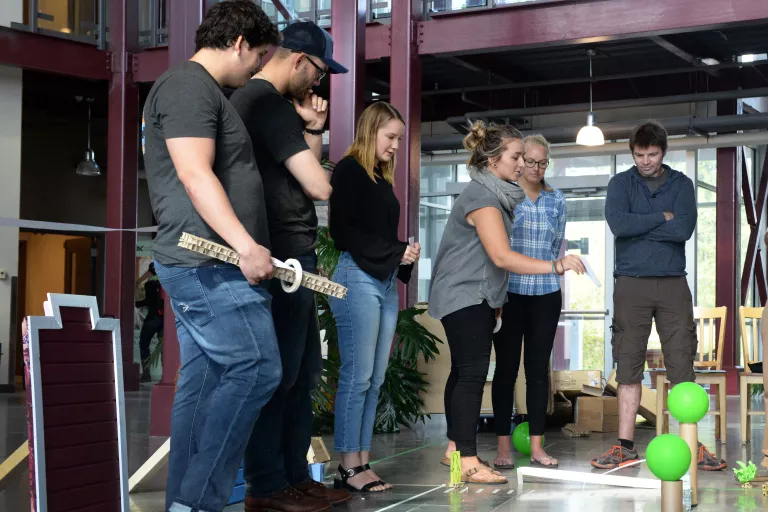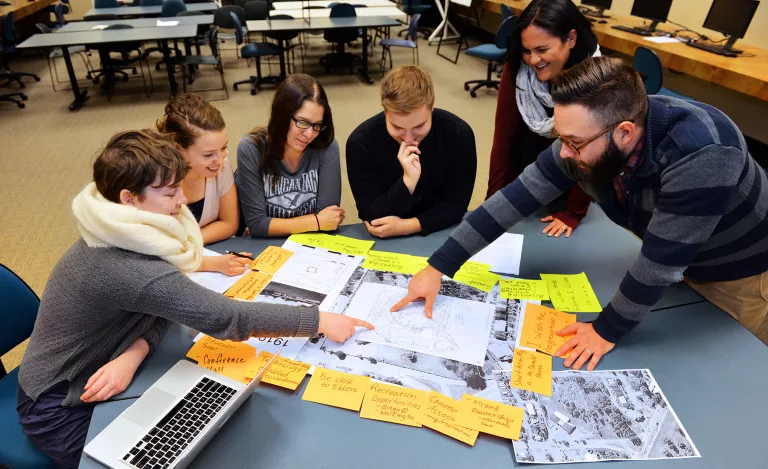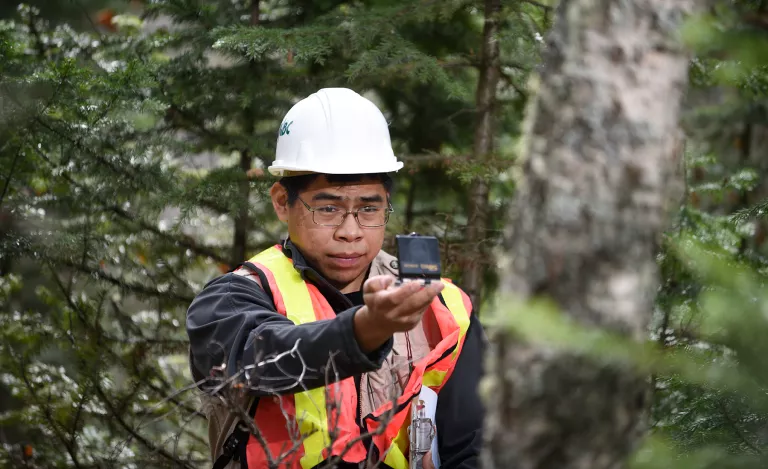
The Environmental Planning program in the School of Planning and Sustainability at UNBC provides a creative and challenging learning environment for students to tackle today’s most contentious issue such as sustainability, climate change, biodiversity, environmental stewardship, and urban sprawl.
Students learn how to help make change, by assessing and identifying key issues, by integrating scientific and technical information, and by learning how to make recommendations that get implemented.
The degree
The Bachelor of Planning (BPl) degree provides a broad education of the relationship between people and the environment. Students will learn how decisions are made about human settlements, resource management, environmental protection, human health and well-being, economic development, and many other areas.
Students are engaged through in-class discussions, group work, and 'real world' community-based projects. Courses include environmental assessment, ecological design, local economic development, First Nations planning, land use planning, sustainable communities, professional practice, and more.
Themes of the north
UNBC's School of Environmental Planning offers a unique undergraduate planning education. Our three themes give students the option of concentrating their Planning degree in one of the following areas: First Nations Planning, Natural Resource Planning, and Northern Rural and Community Planning.
First Nations Planning

This stream integrates cultural and social needs that are developed from within and are grounded in the ecosystem, including infrastructure development, housing, and health planning. To undertake planning with First Nations, students will acquire a sound grasp of planning principles in conjunction with understanding the protocols, history, social structure, and traditional knowledge of First Nations. The aim of planners is to improve the livelihoods of First Nations peoples through sound economic development and skilled land management.
Natural Resource Planning

This stream familiarizes students with planning and decision-making in a variety of sectors that includes provincial land use planning, environmental assessment, watershed planning, and integrated resource and environmental management. By focusing on both natural sciences and social processes, students will learn about provincial land use planning, environmental assessment, watershed planning and integrated resource management. Students address problems that revolve around how to use our natural resources, who benefits, and who should decide.
Northern Rural and Community Planning

This stream combines concepts such as bioregionalism, sustainability, and landscape design within the context of physical land use planning, social planning, and community economic development. Students will study sustainability within the context of land use planning, social planning, and local economic development. The aim is to provide future planners with knowledge that will improve the quality of the built environment while reducing the impact of human activities on the natural world.
For more information about the program or about specific areas of interest, please contact any faculty member of the Environmental Planning program.
An Accredited Planning Degree
The Bachelor of Planning degree is accredited by the Planning Institute of British Columbia (PIBC) and the Canadian Institute of Planners (CIP).
Accreditation is a system for promoting national standards of education in planning and for recognizing educational institutions for a level of performance, integrity, and quality. In Canada, CIP oversees the accreditation process, in conjunction with its provincial associations such as PIBC. CIP establishes criteria for accreditation. The Planning Standards Board is the organization that oversees program accreditation on behalf of the professional associations and the Canadian schools of planning.
Program accreditation benefits ENPL students in three ways.
- Our current students are eligible to apply for Student Membership in PIBC, which is restricted to BC Students currently enrolled in CIP-recognized University planning programs.
- Our graduates are eligible for Full Membership in PIBC and CIP after only two years of professional planning experience. Otherwise, without a degree from an accredited university planning program, Full Membership requires four years of professional planning experience. Only Full Members are entitled to use the professional designations 'MCIP' and 'Registered Professional Planner' (RPP) after their name.
- Our graduates’ job prospects are significantly improved. Employers in the planning field look for students graduating from an accredited planning program. They often advertise for candidates who are either CIP members or eligible for membership. Accreditation is also a consideration in many formal actions by scholarship commissions, governmental funding agencies, and foundations.
As a result of a reciprocal agreement between the American Institute of Certified Planners, CIP recognizes planning programs that have been accredited by the US-based Planning Accreditation Board. In turn, AICP recognizes Canadian planning programs that have been approved by CIP, thus expanding the job market for graduates with the Bachelor of Planning from UNBC. In addition, other countries recognize CIP accreditation.
For more information about accreditation please contact a faculty member in Planning, visit the Planning Standards Board website, or contact one of the following organizations:
Canadian Institute of Planners
116 Albert Street, Suite 801
Ottawa, ON
K1P 5G3
Phone: 800-207-2138 or 613-237-PLAN
Fax: 613-237-7045
American Institute of Certified Planners
1776 Massachusetts Avenue NW
Washington, DC
20036-1904
Phone: 202-872-0611
Fax: 202-872-0643